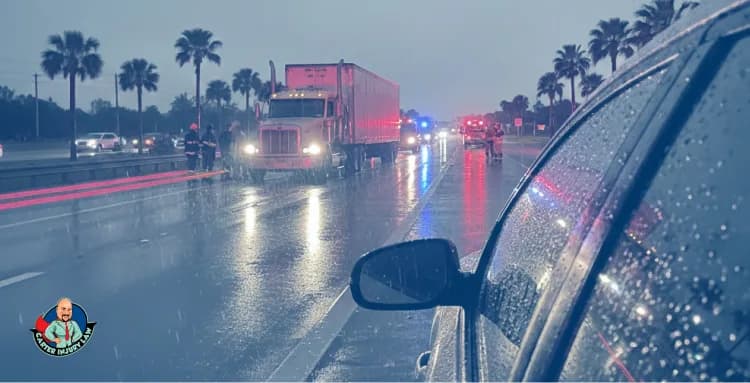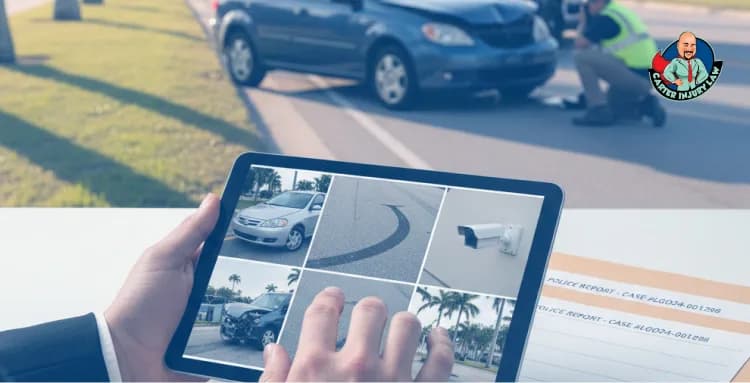We talk a lot about justice for the injured. About what to do when someone hits you, hurts you, leaves you with bills and questions. But what if you're the one who caused the damage? What if it really was your fault?
It’s uncomfortable, sure. Maybe even embarrassing. However, it’s also real, and it happens more often than people like to admit. The truth is, there’s a process for this too. And it starts with not hiding from it.
Let’s talk about what happens next.
1) Step One: Check Your Insurance Coverage
Alright, let’s start at square one — your insurance. Because once you're in a crash and it’s your fault, the first question becomes: What kind of protection did you actually buy?
Bodily Injury Coverage: This One’s Big
This is the coverage that steps in if you’ve hurt someone. And if you don’t have it? Your insurance company’s not going to help. They’re not paying out, they’re not hiring a lawyer, and they’re certainly not defending you in a lawsuit.
A lot of people skip this to save money — big mistake. You’ll wish you hadn’t.
Property Damage Coverage: Florida’s Bare Minimum
Every auto insurance policy in Florida includes at least $10,000 in property damage coverage. That’ll go toward fixing someone else’s car if you caused the crash. But just know — $10K doesn’t go far when vehicles are totaled.
Why the Insurance Company You Pick Matters
Not all insurance companies are created equal. There are the good ones that pick up the phone, assign an adjuster quickly, and start handling the claim like they’re supposed to.
And there are the “cut-rate” companies. The cheap ones. They don’t answer calls, they drag their feet, and when it’s time to protect you? They disappear. That’s not who you want on your side when someone’s threatening to sue.
2) Step Two: Report the Claim Right Away
You’ve been in a wreck, and it was your fault. Now what? Simple — don’t wait around. Call your insurance company right away. The longer you wait, the worse this gets.
Why You Need to Call ASAP
There’s no trophy for “waiting it out.” Your insurance company can’t help you if they don’t know what happened. The faster you report the accident, the sooner they can open a claim and start protecting you.
Delaying just gives the other side a head start.
Your Obligation to Cooperate
This isn’t optional. When you bought your policy, you agreed to work with your insurance company if something goes wrong. That means answering their calls, giving a statement, and helping them evaluate the situation.
If you blow them off or go silent, they can walk away from your defense. Don’t give them that excuse.
Give Them the Full Picture
Send in everything you’ve got — photos from the scene, dashcam footage if you have it, any videos, witness info, even your own notes about what happened.
The more details they have upfront, the better they can protect you. Don’t assume they know anything. Make sure they do.
3) Step Three: Let Your Insurance Company Handle It
You’ve called it in, given them everything they need—now let them do their job. That’s what you’ve been paying them for.
They Take Over From Here
Once the claim is reported, your insurance company steps in. They’re the ones who should be talking to the other driver’s lawyer and insurance company—not you. That’s a battle you don’t want to fight alone.
So let your adjuster carry that weight. That’s the whole point of having coverage.
They’ll Deal With the Legal Side Too
If the other side sends a demand letter or if a lawsuit gets filed, your insurance company is supposed to respond. They’ll either try to settle or assign a defense attorney to represent you. And no—you don’t have to find that attorney yourself (at least not right away).
Why “Policy Limits” Are a Big Deal
Your insurance company only has to protect you up to the amount of coverage you actually bought. That’s called your policy limits.
If the other side wants more than that—say you’ve got $50K in coverage and they want $100K—you could personally be on the hook for the difference. That’s why it’s smart to make sure your insurance isn’t just cheap—it’s enough.
A must-read for you: Should You Take the First Offer from an Insurance Company?
4) Step Four: Protect Yourself from an Excess Judgment
Sometimes, doing everything right still isn’t enough. If the other side thinks your insurance coverage isn’t going to cut it, you’ve got to start thinking about protecting yourself—because nobody else will.
What If They Want More Than Your Policy Covers?
Let’s say you’ve got $50,000 in bodily injury coverage, and the other party’s attorney says, “That’s not enough. We want $100,000.” Now they’re looking at you to make up the difference. That’s called an excess judgment—and it’s exactly what you want to avoid.
Tell Your Insurer to Offer the Full Policy Limits—In Writing
If a demand comes in and it’s within your coverage limits, tell your insurance company—clearly and in writing—to offer the full amount. Not just part of it, not to play games—the full limit.
Say, “Protect me from any judgment beyond this coverage. I want you to offer the policy limits now.” Put that in an email, send a certified letter, and keep records. It shows you tried to resolve it the right way, and that matters if this thing ends up in court.
Sometimes, it’s easier to understand your options when someone explains it to you face to face. Watch it to get real answers from someone who handles these cases every day.
5) Step Five: If You Get Sued — Act Fast
So now it’s gotten real. You’ve been served. This is the part where you don’t want to wait around.
What Does It Mean to Be “Served”?
Being served means someone physically hands you legal papers—usually a complaint and a summons—saying you’re officially being sued. You’ll know it when it happens. And once it does, the clock starts ticking.
You’ve Got 20 Days to Respond
Florida law gives you 20 days to file a response once you’ve been served. That’s not a lot of time. You can’t afford to let that deadline slip by, because if you do, the other side can move for a default judgment—and now you’re in a worse spot.
Get the Lawsuit to Your Insurance Company — Fast
As soon as you're served, get those papers to your insurance adjuster. Don’t just call—email the documents, send them by certified mail, or do whatever you need to do to create a paper trail. Keep a copy for yourself too.
You’re not the one who has to respond to the lawsuit—your insurance company is. However, they can’t do that if you don’t get them the paperwork. It’s part of your duty to cooperate under the policy.
More for you: How to Handle Out-of-State Car Insurance Claims in Florida Accidents
6) What Happens Next: Insurance Lawyers and Court
Alright, so you’ve turned over the lawsuit to your insurance company. Now what? Let’s walk through what comes next once things start moving in the legal system.
Your Insurance Company Hires the Lawyer — Not You
As part of your policy, your insurance company is required to provide a defense. That means they’ll assign an attorney to your case, and they’re the ones who get to pick who that attorney is—not you.
You don’t get to shop around. You don’t get to say, “I want this guy I saw on TV.” They make that decision, and you’re expected to work with whoever they hire.
Watch Out for In-House Attorneys
Some insurance companies use what are called in-house attorneys—lawyers who work directly for them. And while that might sound convenient, you have to remember: their paycheck comes from the insurance company, not from you.
The Insurance Company Covers the Legal Costs
The good news is your insurance company is on the hook for the legal defense. They’ll pay for the lawyer, the court costs, the expert witnesses—everything involved in defending the claim.
You’re not writing checks every week to keep your defense alive. That’s what you’ve been paying those premiums for all these years.












